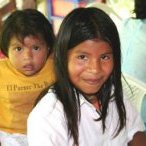English · Español

2 September 2009 | Special reports | Human rights
It is Time
Movements gathered outside Costa Rican Parliament to support indigenous communities who claim passing of historic bill
3:28 minutes
Download: MP3 (2.4 Mb)
500 people gathered outside Costa Rican Parliament in San Jose wearing the unique colors of traditional indigenous clothes, to say “it is time”.
Maycol Morales, 27 years old and member of the bribrí community, joined the mobilization as a university student to claim the passing of the bill to respect traditional territories and other aspects of indigenous culture.
“We are part of a mobilization to state our position in favour of passing the bill for the autonomous development of indigenous peoples”, said Morales from San Jose.
In his opinion, this is about the defense of the identity of indigenous communities, putting the rights of the communities at the same level than the rights of the rest of the citizens “with a territory managed by ourselves, with our identity and our worldview”.
Maycol also highlighted the importance of the bill since it replaces the National Commission of Indigenous Affairs, an agency which has not met the expectations of the communities.
Besides bribrís, in Costa Rica there are many communities, such as Cabecares, Guaymies, Guatusos, Borucas, Térrabas, Huetares, Chorotegas, Miskitos and Sumos Teribes. All of which are part of the determined campaign to pass the bill.
Maycol regretted the fact that there aren´t representatives elected by the indigenous communities in parliament, although he said that part of the political system, at least some of it, is committed to passing the bill.
In addition, in light of the elections in Costa Rica which will take place next year, Maycol Morales said the indigenous movement is determined to occupy all social and political spaces at central and local levels. “Being an indigenous person is not enough, we need to have a clear indigenous identity”.
The indigenous mobilization which took place on September 1st gathered organizations of native peoples and also students and environmentalist organizations from the Central American country. It is clear that the struggle for indigenous territories, keepers of the vast biodiversity of Costa Rica, in addition to resources which are essential to life, has no ethnic borders, but political and ideological ones.
This is what Alejandra said, from environmentalist organization COECOCEIBA Friends of the Earth Costa Rica.
Alejandra also made reference to the generalized feeling of indignation towards the indifference of political actors and Arias´ administration in general.
This bill was promoted originally by the indigenous peoples themselves, and Costa Rica is one of the countries which has spent more time “discussing” the issue. “For 15 years, the indigenous peoples have struggled for its passing, to achieve the recognition of our autonomy. Other countries in Latin America have taken this step. Brazil in 1991, Peru in 1993, Nicaragua in 1995, Bolivia in 1994, Venezuela in 1999 to name a few.”
The mobilization held by indigenous representatives from all the country was carried out under the theme “last warning”. They stated that from now on the indigenous presence would increase if the bill is not passed.
Maycol Morales said there is a national and global context which causes the struggle for indigenous territories to acquire highly political dimensions, creating strong alliances to “build a common front, since the problem suffered by the indigenous peoples is a national problem”.
Photo: http://pachamamacaribe.com







